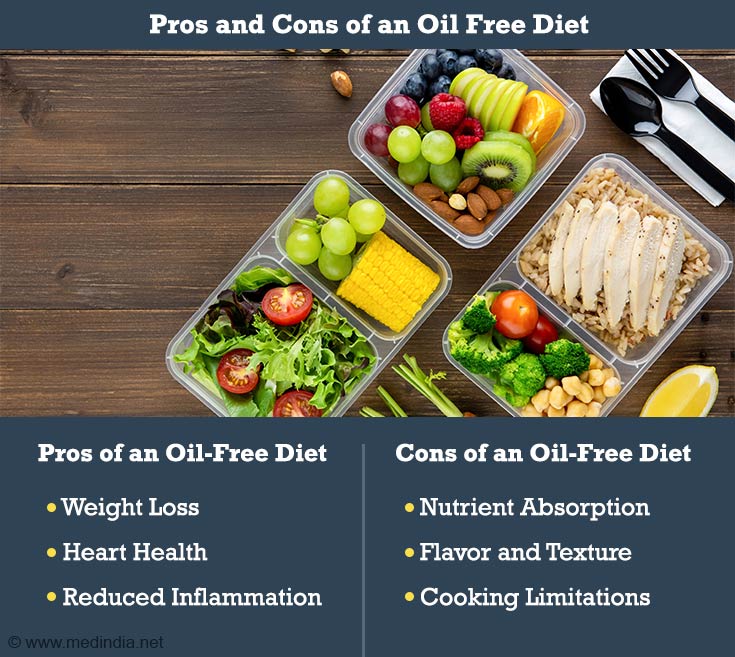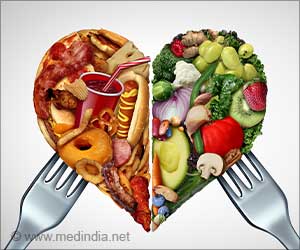- Health Benefits of the Mediterranean Diet: Metabolic and Molecular Mechanisms - (https://pubmed.ncbi.nlm.nih.gov/29244059/)
- Trans fatty acids - A risk factor for cardiovascular disease - (https://pubmed.ncbi.nlm.nih.gov/24639860/)
- Fat-Soluble Vitamins - (https://www.ncbi.nlm.nih.gov/books/NBK218749/)
About
Oil-free diets have emerged as a popular choice for individuals seeking to improve their health and well-being. By eliminating oil from their diet, proponents of this dietary approach believe they can reap numerous benefits, ranging from weight loss to heart health. However, like any dietary regimen, oil-free diets come with their own set of pros and cons. Let's explore the intricacies of oil-free diets, shedding light on their potential advantages and drawbacks.
What is Oil-Free Diet?
An oil-free diet, as the name suggests, involves abstaining from the use of cooking oils in food preparation. This means avoiding oils derived from both plants and animals, such as olive oil, coconut oil, and butter. Instead, individuals following an oil-free diet rely on alternative cooking methods, such as steaming, boiling, baking, and sautéing using water or broth.
Moreover, an oil-free diet extends beyond eliminating oils from cooking; it involves avoiding hidden oils in processed foods as well. Many packaged foods contain added oils for flavor and texture, so individuals adhering to an oil-free diet must carefully read labels to ensure compliance.
Did You Know?
The average person consumes approximately 35 pounds of cooking oil per year. That's equivalent to over 4 gallons or 16 liters of oil annually!Additionally, oil-free cooking encourages the consumption of whole, unprocessed foods, such as fruits, vegetables, whole grains, legumes, nuts, and seeds, which are naturally low in fat and rich in essential nutrients.
By embracing an oil-free diet, individuals can explore a wide range of flavorful and nutritious dishes that showcase the natural flavors and textures of whole foods. From vibrant salads to hearty soups and stir-fries, the possibilities for oil-free cooking are endless, offering a delicious and healthful approach to mealtime. This dietary approach not only promotes weight management and overall health but also supports environmental sustainability by reducing reliance on resource-intensive oil production.
Importance of an Oil-Free Diet
Advocates of oil-free diets tout various health benefits associated with this dietary approach. One of the primary reasons people opt for oil-free cooking is to support weight-loss efforts. Oils are calorie-dense, with just one tablespoon containing around 120 calories(1✔ ✔Trusted Source
Health Benefits of the Mediterranean Diet: Metabolic and Molecular Mechanisms
Go to source). By cutting out oil, individuals can significantly reduce their calorie intake, making it easier to achieve and maintain a healthy weight.
Moreover, oil-free diets are often lauded for their potential to promote heart health. Cooking oils, particularly those high in saturated and trans fats, have been linked to an increased risk of heart disease by raising levels of LDL (bad) cholesterol in the blood(2✔ ✔Trusted Source
Trans fatty acids - A risk factor for cardiovascular disease
Go to source). By eliminating oils, individuals can lower their intake of harmful fats and reduce their risk of cardiovascular issues.
What are the Pros and Cons of an Oil-Free Diet

Pros of Oil-Free Diet
Weight Loss: Eliminating oils can aid in weight management by reducing overall calorie intake.
Heart Health: Oil-free diets may lower LDL cholesterol levels, decreasing the risk of heart disease.
Reduced Inflammation: Some research suggests that oil-free diets can help reduce inflammation in the body, which is linked to various chronic diseases.
Cons of Oil-Free Diet
Nutrient Absorption: Cooking oils aid in the absorption of fat-soluble vitamins, such as vitamins A, D, E, and K(3✔ ✔Trusted Source
Fat-Soluble Vitamins
Go to source). Eliminating oils may impair the body's ability to absorb these essential nutrients.
Flavor and Texture: Oils contribute to the flavor and texture of many dishes, and removing them may result in less palatable meals.
Cooking Limitations: Certain cooking methods, such as frying, may be challenging without the use of oil, limiting culinary options.
No Oil Diet Recipes
Transitioning to an oil-free diet doesn't mean sacrificing flavor or variety in your meals. There are plenty of delicious recipes that showcase the versatility of oil-free cooking. Here are a few ideas to get you started:
Quinoa Salad with Lemon-Herb Dressing:
Toss cooked quinoa with fresh vegetables and a zesty dressing made from lemon juice, herbs, and Dijon mustard.Baked Sweet Potato Fries:
Slice sweet potatoes into wedges, season with your favorite spices, and bake until crispy for a healthier alternative to traditional fries.Stir-Fried Vegetables with Soy-Ginger Sauce:
Sauté a colorful mix of veggies in a flavorful sauce made from soy sauce, ginger, garlic, and vegetable broth.In conclusion, oil-free diets offer a compelling approach to improving health and well-being, with potential benefits ranging from weight loss to heart health. However, it's essential to weigh these advantages against the potential drawbacks, such as nutrient absorption issues and cooking limitations. By making informed choices and exploring alternative cooking methods, individuals can embrace the benefits of oil-free cooking while still enjoying delicious and satisfying meals.









